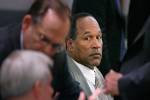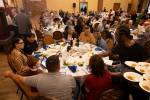Everyone believes in something
Q: I've never experienced any concrete proof of angels, demons, Jesus or God. At age 11, I did meet Charles Manson and his hippie entourage. They seemed docile and kind at the time. You'd never believe they'd commit the gruesome murders on record.
How can anyone really expect to be happy all the time and never suffer strife? Maybe Dr. Wayne Dyer and Oprah Winfrey can awaken each morning in their chosen homes of beatific surroundings. But most of us endure fewer choices, work in demanding jobs and grapple daily with the absurdities of life.
Does it make a difference what we choose to experience? It seems no matter the "free will" given, whether we choose to harm or heal -- does it really matter? Although I would always or mostly choose love over hate, would rather help than harm -- does it really matter when this world we live in allows good and bad to coexist?
Are we here simply to sample or take on a good or evil persona? Since there's no concrete proof of life after life, I ask, does anything really mean anything? -- J.P., Las Vegas
A: Your question reveals many things you already presuppose about this life, even while you wonder about what life means, if it means anything at all.
You juxtapose angels and demons, Collective Goodness (Jesus) with Collective Evil (Charles Manson). You recognize that both good and evil are ultimately bigger than any one human being.
You recognize, without bitterness or envy toward Oprah or Wayne, that money is an illusion of protection from the deeper, universal truth that life is suffering. Strife, you call it. Money might "buffer" that, for a while, but even the rich must finally face the common path of loss, limits, decline, decay -- impermanence.
You are convinced that you would "always or mostly choose love over hate, would rather help than harm." But why, J.P.? Why do you prefer love and help over hate and harm? I doubt it's because love and help are stylish. May I suggest you prefer love and help because you find meaning in loving and helping?
You notice "this world we live in allows good and bad to coexist." Interesting word, "allows." You hint at a world view that demands accountability. Someone or something or some source "allows" good and evil to coexist. You remind me of Pulitzer Prize winner Archibald MacLeish, who, in 1952, published a collection of poems including "J.B.," based on the Hebrew story of Job. In MacLeish's verse, Satan taunts, "If God is good, then he is not God; if God is God, then he is not good."
MacLeish's Satan expects God to be accountable. For allowing good and evil to coexist.
Human beings are distinguished from every other life form on this planet in that they must discover meaning. Failing that, they must make meaning.
Failing both of those things, human beings tend to drink a lot and watch "Ultimate Fighting Championship" on television.
My supervisor once said with complete confidence, "There are no ultimate truths," to which I replied, "... except for that one."
My point was not that I know or can prove that ultimate truth exists. Rather, my point was that no one -- and I mean no one -- can live without making a faith commitment to some truth to which they give ultimate credence. Everyone believes in something, even if that "something" is nothing.
This became a powerful tool for J.R.R. Tolkien in his Christian evangelism for the notorious Oxford atheist C.S. Lewis.
"You know what a myth is, Clive?" Tolkien is purported to have asked.
"Indeed," responded Lewis.
"Well," said Tolkien, moving in for the kill, "Christianity is a true myth."
Lewis was baptized the following week.
J.P., you're asking if anything has meaning for a man who writes a column called "Human Matters." I can't prove that being human matters. But I've decided to live as if it does.
So choose your myth, and live it with passion.
And choose wisely.
Steven Kalas is a behavioral health consultant and counselor at Clear View Counseling and Wellness Center in Las Vegas. Questions can be e-mailed to skalas@reviewjournal.com.
STEVEN
KALASHuman MattersMORE
COLUMNS























